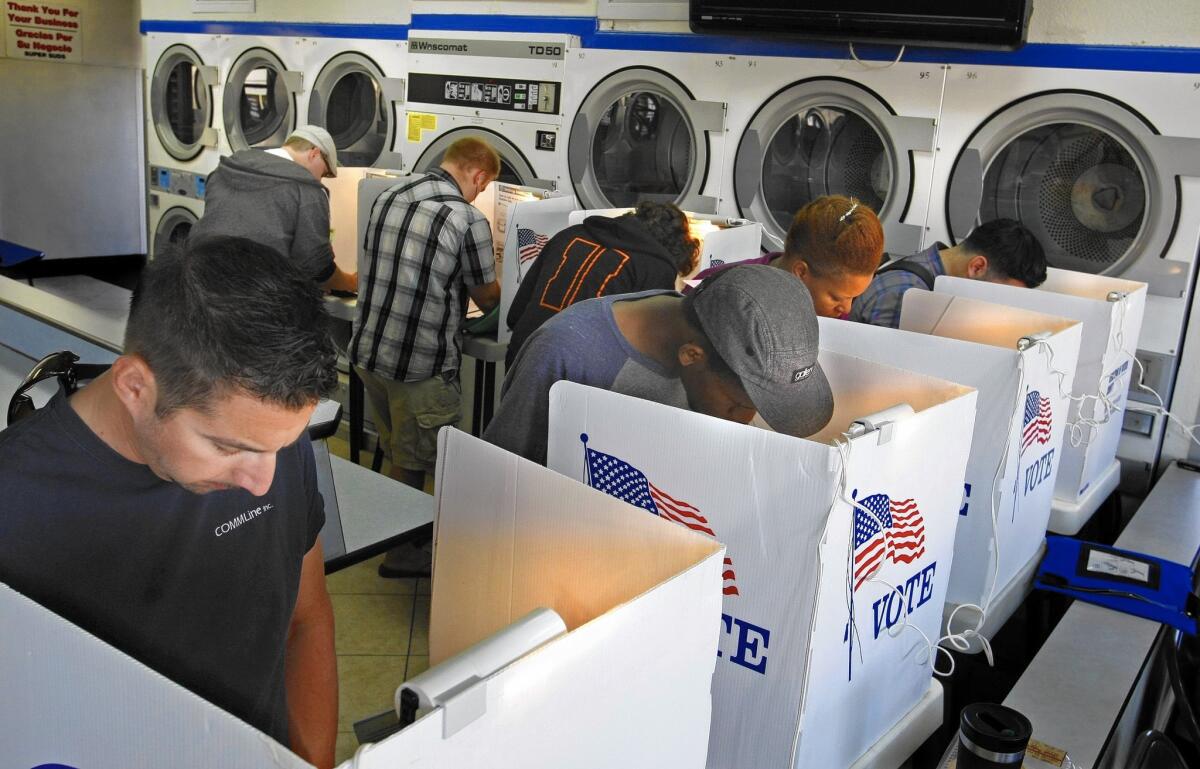Officials warn of June 7 primary voter ‘surge’

More than 600,000 Californians have registered to vote online or updated their registration in just the last three months. Above, voters cast ballots at a Long Beach laundromat in November 2012.
SACRAMENTO — California election officials are anticipating a surge in voter turnout for the June 7 presidential primary election.
More than 600,000 Californians have registered to vote online or updated their registration in just the last three months, and county election agencies may be overwhelmed by the volume of people who show up, Secretary of State Alex Padilla warned Gov. Jerry Brown.
Voter registration application cards are in high demand statewide, he wrote in a letter Monday to the governor. Padilla also wrote that “one campaign” alone recently requested 200,000 registration forms to sign up voters, although he did not specify which candidate’s campaign made it.
“Our data suggests a surge in voter participation in both the presidential primary election in June and the general election in November,” Padilla wrote in the letter.
Padilla requested a meeting with Brown to discuss the resources and time counties will need to ensure the elections go smoothly. Specifically, the secretary of state is asking the governor and Legislature for an extra $32 million to help county election officials and his agency handle the increased workload.
“High interest in the 2016 election cycle, a significant rise in the use of online voter registration, growing demand for registration cards, and increased voter turnout in neighboring states suggests that California could see a major surge in voter turnout,” Padilla said in a statement released Tuesday.
Padilla said he expected county election agencies to be hit with increased costs, including the need to print more ballots, and will need additional staffing.
“The fact that California’s primary has such a high profile in the national presidential contest … means that we need to ramp up,” said Los Angeles County Registrar-Recorder/County Clerk Dean Logan.
Orange County Registrar of Voters Neal Kelley said he’s seen a major spike in people registering to vote in the last few months and expects to see high turnout in both the June and November elections.
“The good thing is that there’s interest in the election. That’s what we’re all about,” said Kelley, who also serves as president of the California Assn. of Clerks and Election Officials.
Counties will have to hire and train temporary workers and volunteers to keep up and make sure that polling sites do not wind up with long lines on election day. “It’s going to be a tough climb, I’m not going to lie to you,” Kelley said. “I think there will be some counties who I think will be short of resources.”
Election agencies in California’s 58 counties also are being swamped with a massive number of petitions for proposed November ballot initiatives. Under state law, local election officials are required to verify petition signatures are from qualified registered voters. As many as 9.4 million signatures may need to be verified across the state, according to Padilla’s office.
Supporters of 13 proposed measures are still gathering the signatures needed to qualify for the November ballot, and are expected to submit them to county agencies shortly before the June primary election.
“It’s a crunch period,” Logan said.
The swell in voter interest and increased workload in preparing vote-by-mail ballots comes at the same time that many county election officials are inundated with petitions for ballot measures. And that’s “not the best timing,” Kelley said.
With as many as 21 potential measures on the November ballot, the voter guides that arrive in the mail could be up to 288 pages long — and county election agencies are required to pick up the tab for printing costs.
Donald Trump leads a Republican presidential field that has been winnowed down to just three contenders, with Texas Sen. Ted Cruz and Ohio Gov. John Kasich.
Despite his victories in earlier state primaries, Trump lacks enough delegates to capture the Republican nomination outright, meaning California could decide the fate of the GOP race.
California’s 172 GOP delegates — 14% of the 1,237 required to win the nomination — will be chosen on the last big day of the voting calendar.
On the Democratic side, Hillary Clinton has accumulated such a substantial delegate lead over rival Sen. Bernie Sanders that she remains the clear front-runner in the race.
Because Democrats allow decline-to-state voters to participate in their presidential primary, counties will need to have extra “crossover ballots” on hand at polling places, Padilla said. The GOP holds a closed primary, so anyone who wants to cast a ballot for one of the party’s three remaining presidential candidates must be a registered Republican.
The rest of the ballot — the Senate contest and congressional and local races — will still be for the “top two” candidates to advance to the general election.
Twitter: @philwillon
For the latest news on California politics subscribe to the free daily newsletter at latimes.com/essentialpoliticsemail







